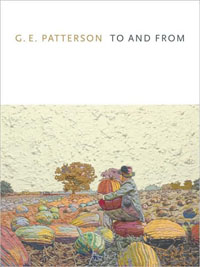 G. E. Patterson
G. E. Patterson
Ahsahta Press ($17.50)
by E. K. Mortenson
In a recent issue of The Writer’s Chronicle, Reginald Shepherd writes: “The ideal reader is on the one hand willing and alert enough to actively participate in the poem’s production of meaning and on the other hand demanding enough to insist that the poem provide the material with which to produce such meaning.” This could well serve as a frontispiece for G.E. Patterson’s To and From, which expects the very sort of ideal reader Shepherd describes.
Each of the poems in Patterson’s volume may be loosely classified as a sonnet—each has fourteen lines, grounding the reader in familiar poetic territory—but within that form, Patterson’s paratactic verse keeps the reader adrift enough to remember that even in the closed world of the sonnet’s argumentative structure, there is much that cannot be resolved. Patterson even seems to allude to this situation in “‘Curiosity, Tenderness, Kindness, Ecstasy’”:
Yes it is hard to speak of what it was
Look how he tries to link the dots and arrows
Calling out those names we can imitate
. . . . . . . . . . . . . . . . . . . . . . . . . . . . . . . .Suddenly the edge doesn’t seem away
Each of Patterson’s poems aches for the “dots and arrows” to be connected and followed, but each drifts maddeningly from the reader’s grasp. Yet though elusive, Patterson’s poems strike the perfect balance between clarity and opacity. There is “enough” in the verse to keep readers hungry:
How do we long to think in terms of wholes
See that words don’t fall to the ground together
Start across the uneven field of grass
One of us says meaning the other should
Perhaps one interest is something like safety
(“‘Glib Pirouette out of Messiness’”)
Such passages demonstrate Patterson’s deep understanding of our precarious, postmodern condition: We desperately wish to see the whole, to perceive all, but we are constantly thwarted in our attempts. As he writes in partial conclusion of the above poem, “All this is too large to be seen at once.”
Patterson is a poet to be admired, a poet whose use of poetic form demands that readers be open to both cohesion and fracture in the verse and in their lives. To return to Shepherd: “The reader must reach out to the poem, but the poem must also reach out to the reader, however obliquely.” To and From certainly demands this from the reader, and offers this in return. In an age of one-sided poetic transactions, this volume is a welcome addition.
Click here to buy this book from Amazon.com
Click here to buy this book from Powells.com
Rain Taxi Online Edition, Summer 2008 | © Rain Taxi, Inc. 2008
